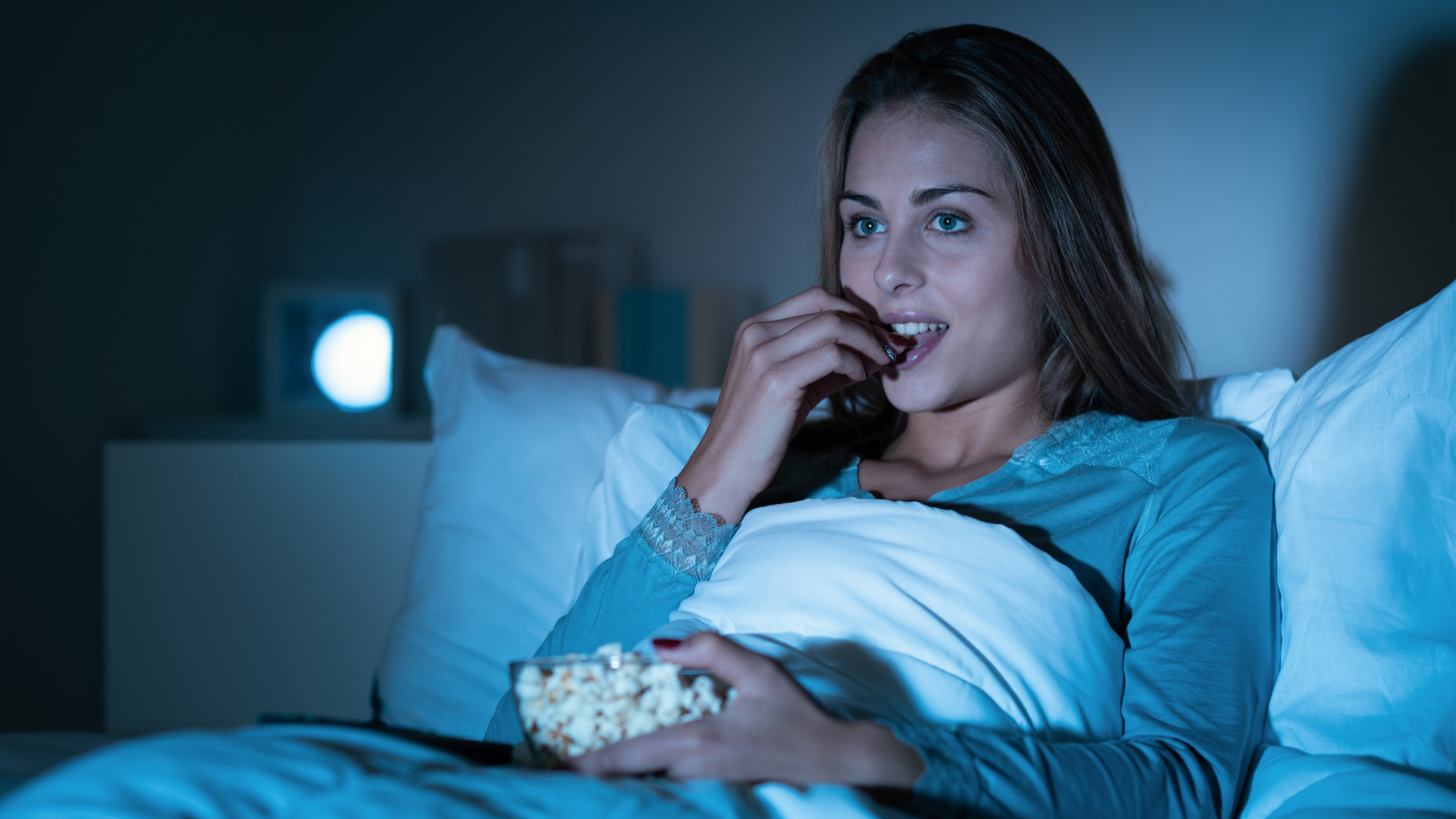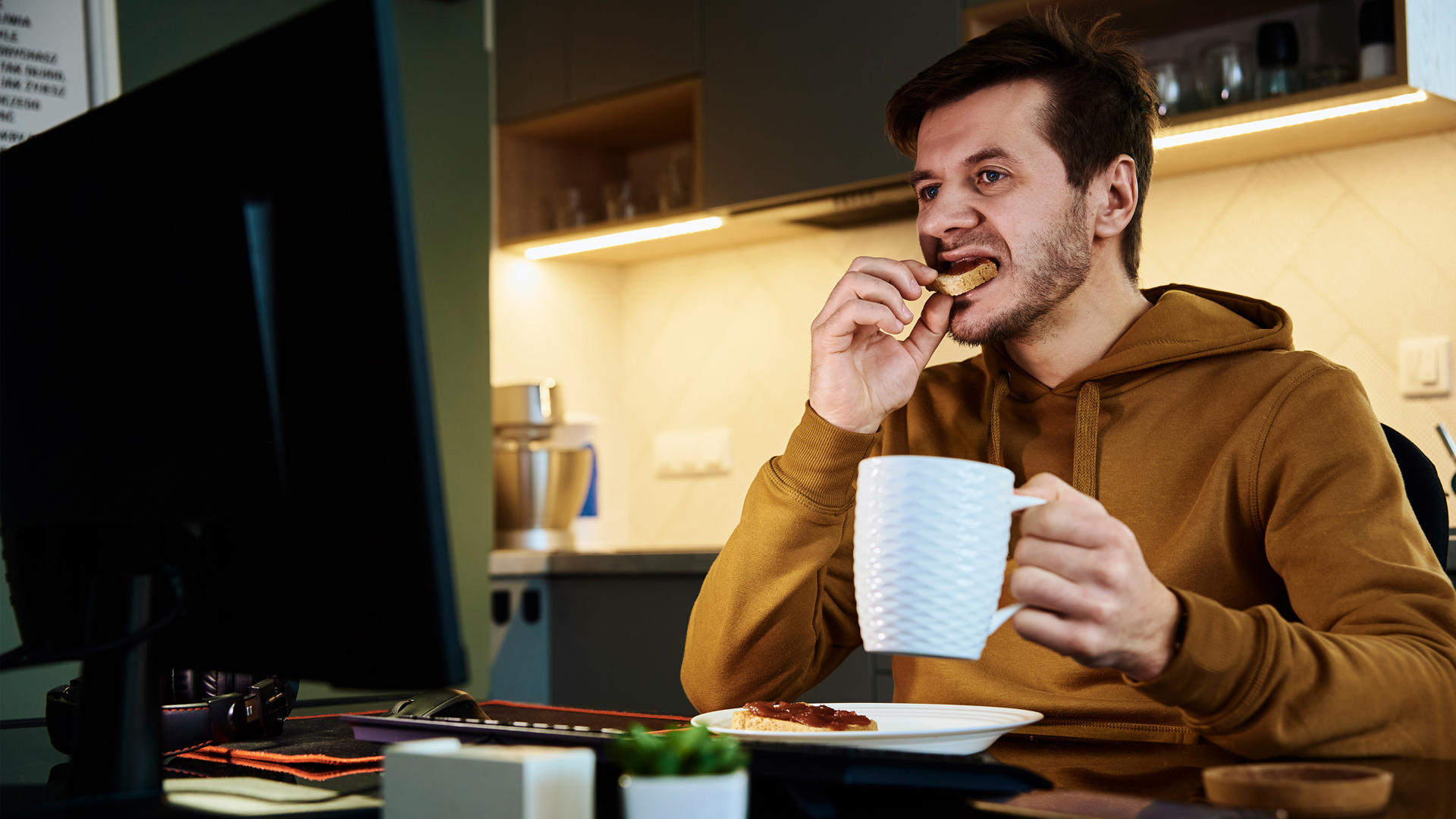Should you eat before bed?
Late night cravings are often inevitable but should you eat before bed or will it affect your health?

Is it a good idea to eat before bed? Dieticians often advise against it because it can have an impact on your digestion while potentially disrupting the quality of your sleep. It also goes against some popular diets such as intermittent fasting – even though you may feel hungry by that time.
Yet sometimes it's hard to resist the temptation of a midnight snack. You may be craving carbs after one too many drinks or looking for something to satisfy that post-dinner sweet tooth. Maybe you have a busy schedule or just find you haven’t eaten enough during the day (in which case, upping your protein intake with the best protein powder for weight loss could be a good starting point).
But what actually happens to your body when you eat before bed? To help us explain, we asked Sophie Medlin, a registered dietician at CityDieticians.
Eating before bed: Digestion
It’s important that your body absorbs the right nutrients from your food, and good digestion is key to ensuring you don’t experience bloating or discomfort after eating.
Since our bodies are less efficient at digesting food at night, this means any food eaten before bed can stay in your digestive tract for too long a time, causing reflux in the night and bloating the next day.
According to Medlin, this can also negatively impact your blood cholesterol and blood sugars. “We all have what we call a ‘biological night’ around 9pm,” Medlin says. “This is when we are less efficient at digesting and processing food.”
Research published in StatPearls has also found that avoiding food three hours before bed could relieve symptoms of digestive issues like acid reflux. This is because eating before bed can cause you to wake more in the night, which can cause reflux.
Start your week with achievable workout ideas, health tips and wellbeing advice in your inbox.
Eating before bed: Weight
Diets such as intermittent fasting suggest limiting the hours you consume food during the day could help you to lose weight. But does fasting work? Medlin stresses that there isn’t any convincing evidence that eating at different times affects our weight yet.
Some research has found that people who eat close to bedtime are more likely to gain weight because of their attitude towards food and eating, however. For example, a 2014 study found that people who eat before bed are more likely to gain weight because they have a greater number of eating occasions throughout the day and therefore a higher total daily caloric intake.
Yet this research doesn’t account for those who may not eat in excess during the day. “In general it is all about energy balance rather than distribution and timing of eating,” Medlin explains.

Eating before bed: Sleep quality
Although sleep quality can be affected by your overall health (it relies on a healthy diet and ensuring you’re consuming enough nutrients, protein, healthy fats, vitamins, magnesium and calcium), there is evidence to suggest eating before bed can have a negative impact on the quality of your sleep.
A study published in Sleep Health, for instance, found that eating or drinking less than an hour before bedtime was associated with waking up shortly after falling asleep – a key symptom of chronic insomnia. Meanwhile, research published by the Journal of Biological Rhythms showed eating before bed can disrupt your circadian rhythm (your body’s internal clock that regulates your sleep times). It suggests your body is best at digesting food when you are active and light is present.
“When you are trying to sleep but your body still needs to digest food, you usually won’t be able to fall into a deep sleep because your organs need to stay awake to process your food,” Medlin explains. She says this is why people might experience strange dreams when eating before going to bed.
Are there any benefits to eating before bed?
Scientists suggest eating before bed isn’t a good idea for the most part. But this doesn’t mean you should skip a meal or go to bed hungry if your only option is to eat late at night.
“If someone isn’t getting enough food during the day, going to bed hungry will also keep them awake,” Medlin says. She suggests people opt for something light such as a small smoothie or rice cakes.
There are also some foods that aid sleep. “Foods that contain B vitamins, such as milk, meat, eggs and pulses are important for sleep because they make the precursors to the hormones that induce sleep,” explains Medlin.
This doesn’t mean you should eat a steak before bed, though. “Our body takes time to convert the B vitamins into the hormones we need for sleep and it is about getting dietary balance right rather than providing an immediate sleep aid.”
Alice Porter is a freelance journalist covering lifestyle topics including health, fitness and wellness. She is particularly interested in women's health, strength training and fitness trends and writes for publications including Stylist Magazine, Refinery29, The Independent and Glamour Magazine. Like many other people, Alice's personal interest in combining HIIT training with strength work quickly turned into a CrossFit obsession and she trains at a box in south London. When she's not throwing weights around or attempting handstand push-ups, you can probably find her on long walks in nature, buried in a book or hopping on a flight to just about anywhere it will take her.